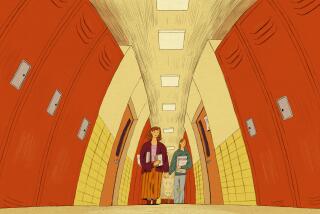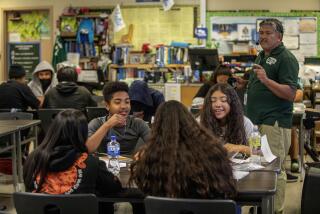School Isn’t Just for the Fun of It : Education: Should students expect to be entertained rather than tackling tough studies that will benefit them later?
- Share via
I was flipping the dial on my tiny black-and-white TV the other night when I saw a crocodile slithering from an Australian swamp. Fascinated, I thought what a wonderful teaching tool this program would be. I hoped many teachers were taping it to enchant their classes tomorrow or sometime soon. And, sure enough, the teachers in our neighborhood school showed the great crocodile special complete with exciting shots of baby crocs being helped from their shells by a fierce-looking mama. But, when I asked some kids about the show, I found that they were less than impressed:
“It was boring,” said one 8-year-old boy.
“No action. I like the Ninja turtles better,” was the judgment of a 9-year-old freckle-faced fourth-grader. Both are bright and good students, but they are already too jaded to appreciate a terrific science program.
It reminded me of my mother’s stories about teaching elementary school in the 1940s. It was a poor school with many Eastern European refugees, and there was no money for even the simplest audio-visual aids. The teachers clipped pictures of apples, tomatoes, flowers and animals from magazines and put them on the walls of the classrooms. Seeing a full-color film of crocodiles in the swamp was a fantasy as remote as taking your summer vacation on the moon.
Still, the children learned. They sat at their desks and wrote hundreds of sentences and did hundreds of math problems, the kind of dull drill that today might be considered child abuse. But, stimulated by a young teacher’s force of personality and her desire to help them become successful adults, the kids responded.
I think the difference was that everybody--parents, teachers and children--saw school as a hard, serious exercise on the path to adulthood. Nobody cared if the child had fun in school. The only important consideration was “Did you learn?”
My mother felt sorry for her third-grade students in their dull routine, and she decided to take them on a field trip one day. It was a revolutionary idea, so there were no big yellow buses to pick up and deliver the youngsters. Mom led her class to the bus, and they marched on in single file, each little one giving the fare to the driver.
At a nearby riverside park they marched off the bus and spent the morning looking at the flora and fauna of the wilderness. The kids were overcome with joy at such an exciting event. They couldn’t stop talking about the wondrous day.
Contrast that reaction to one of a third-grader returning recently from her second class trip to our fabulous zoo: “The fun part was eating burgers, but the animals were boring.”
Teachers today struggle to create exciting learning atmospheres and meaningful lessons for their students. At our neighborhood school, the classrooms look like fairylands. The walls are covered with colorful art, photographs, maps and crafts. Still, many of the kids don’t learn, and they’re bored.
Maybe that’s because school is hard work, and no amount of sugar coating changes that basic fact. Maybe we are cheating our kids in the worst possible way by telling them that school is, or should be, fun. Maybe we should ask our children as they return from school “Did you learn? Were you attentive? What did you learn?” not “Did you have fun?”
School--like life--is hard but worthwhile. We have to stop looking at teachers as entertainers and kids as hard-to-please patrons of a vast amusement park misnamed school. Let’s stop expecting the school district to send in the clowns to make our kids happy--let’s us start sending them students who know what school is all about.
More to Read
The complete guide to home viewing
Get Screen Gab for everything about the TV shows and streaming movies everyone’s talking about.
You may occasionally receive promotional content from the Los Angeles Times.






